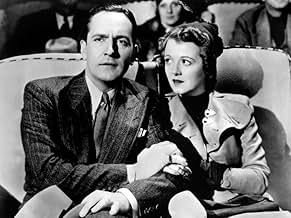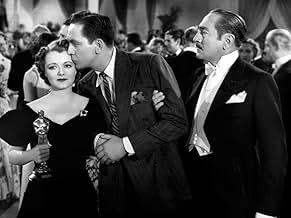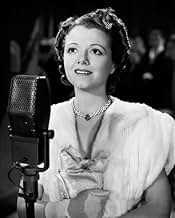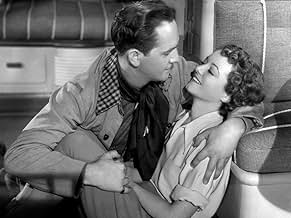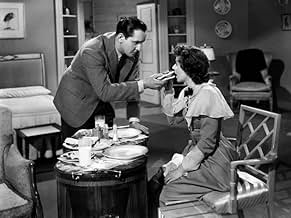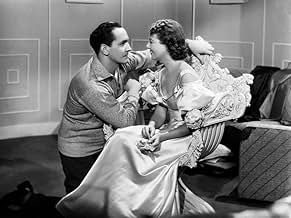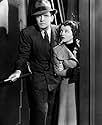VALUTAZIONE IMDb
7,3/10
11.557
LA TUA VALUTAZIONE
Una giovane donna arriva a Hollywood con sogni di celebrità, ma li raggiunge solo con l'aiuto di un noto attore, ora alcolizzato, il cui periodo di maggior fama è ormai alle sue spalle.Una giovane donna arriva a Hollywood con sogni di celebrità, ma li raggiunge solo con l'aiuto di un noto attore, ora alcolizzato, il cui periodo di maggior fama è ormai alle sue spalle.Una giovane donna arriva a Hollywood con sogni di celebrità, ma li raggiunge solo con l'aiuto di un noto attore, ora alcolizzato, il cui periodo di maggior fama è ormai alle sue spalle.
- Regia
- Sceneggiatura
- Star
- Vincitore di 1 Oscar
- 7 vittorie e 7 candidature totali
Guinn 'Big Boy' Williams
- Posture Coach
- (as Guinn Williams)
Jean Acker
- Woman at Preview
- (non citato nei titoli originali)
Eric Alden
- Niles' Assistant
- (non citato nei titoli originali)
Irving Bacon
- Station Agent
- (non citato nei titoli originali)
Jane Barnes
- Waitress #1
- (non citato nei titoli originali)
Vince Barnett
- Otto
- (non citato nei titoli originali)
Clara Blandick
- Aunt Mattie
- (non citato nei titoli originali)
Recensioni in evidenza
I had not watched this movie until today, passing up each opportunity over the years to view it, as I feared it would not live up to the 1954 blockbuster starring Judy Garland and James Mason.
I was right, it does not; it far surpasses the 1954 remake. Judy Garland is my favorite all-round entertainer, favorite singer, and the songs in the 1954 movie are classic treasures, and James Mason never disappoints in any film. However, in the 1937 version the story is told more sensitively, with more shading. Janet Gaynor is perfect as the home-grown farm girl seeking to make her mark in Hollywood, and Fredric March is very convincing as the has-been who cannot cope with his declining value in Hollywood, especially since he caused much of it himself.
I had thought that I might miss the music in this earlier version, but I found after having watched it that I didn't miss it at all. The movie was engrossing from beginning to end and stood on its own merits. I was moved by this film in a way that I never had been by the later remake.
SEE this film if you love a good story; don't put it off for years the way I did. Simply, simply wonderful...
I was right, it does not; it far surpasses the 1954 remake. Judy Garland is my favorite all-round entertainer, favorite singer, and the songs in the 1954 movie are classic treasures, and James Mason never disappoints in any film. However, in the 1937 version the story is told more sensitively, with more shading. Janet Gaynor is perfect as the home-grown farm girl seeking to make her mark in Hollywood, and Fredric March is very convincing as the has-been who cannot cope with his declining value in Hollywood, especially since he caused much of it himself.
I had thought that I might miss the music in this earlier version, but I found after having watched it that I didn't miss it at all. The movie was engrossing from beginning to end and stood on its own merits. I was moved by this film in a way that I never had been by the later remake.
SEE this film if you love a good story; don't put it off for years the way I did. Simply, simply wonderful...
A young country girl named Ester Blodgett (Janet Gaynor) arrives in Hollywood filled with dreams of becoming a famous movie starlet. However, she gets nowhere until she's noticed by famous movie star Norman Maine (Fredric March), a performer on his way down in terms of popular appeal. The two fall in love but just as Ester's star, under the stage name Vicki Lester begins to rise, Maine's begins to fade.
The best thing about this film is the performance given by Fredric March as actor Norman Maine. He nails the inner emotional turmoil going on inside his character and makes him always sympathetic to the viewer even as Maine falls in and out of sobriety. It's Maine's character that proves most interesting to the viewer here as March completely steals the film away from star Janet Gaynor.
Gaynor doesn't prove quite as appealing or convincing in her lead role as Ester Blodgett/Vicki Lester and honestly it's hard to see why the public should favor her so. Maybe this was to symbolize the fickleness of the public in that they should prefer a pretty new face over a talented older one. Who knows? Nevertheless Gaynor just doesn't ever prove as appealing here in her role as she should.
The best thing about this film is the performance given by Fredric March as actor Norman Maine. He nails the inner emotional turmoil going on inside his character and makes him always sympathetic to the viewer even as Maine falls in and out of sobriety. It's Maine's character that proves most interesting to the viewer here as March completely steals the film away from star Janet Gaynor.
Gaynor doesn't prove quite as appealing or convincing in her lead role as Ester Blodgett/Vicki Lester and honestly it's hard to see why the public should favor her so. Maybe this was to symbolize the fickleness of the public in that they should prefer a pretty new face over a talented older one. Who knows? Nevertheless Gaynor just doesn't ever prove as appealing here in her role as she should.
When you see this masterpiece, remember that more than 65 years have passed since it debuted on the big screen. How many contemporary films will dazzle and delight in 2065?
Sure, we have seen this story before, but this was the first incarnation. Sure all films are in color today, but notice the rich, full-rigged use of color here, only a decade after talkies began. Dialogue sound familiar, well many of the lines originated here (thanks Dorothy Parker).
First caught this in the movie theatre around 1975 as this David O. Selznick production had been out of circulation. Judy Garland's troubled but ultimately engrossing and hugely entertaining remake was already familiar to me. So how does a classic compare to its first version. To me, it is one of the 1930's masterworks.
How perfect to cast Janet Gaynor in the role, an Oscar winner herself at 20 --- that child-like voice unforgettable. Fredric March, like Gaynor already a star and early Oscar recipient, world weary and helpless. The art deco, lavish production, haunting music, and scene after scene of "behind the scenes Hollywood", well they sure worked for me. "Kitsch" an old friend labeled it, but to me, memorable.
I love watching this movie --- hope you enjoy it as well.
Sure, we have seen this story before, but this was the first incarnation. Sure all films are in color today, but notice the rich, full-rigged use of color here, only a decade after talkies began. Dialogue sound familiar, well many of the lines originated here (thanks Dorothy Parker).
First caught this in the movie theatre around 1975 as this David O. Selznick production had been out of circulation. Judy Garland's troubled but ultimately engrossing and hugely entertaining remake was already familiar to me. So how does a classic compare to its first version. To me, it is one of the 1930's masterworks.
How perfect to cast Janet Gaynor in the role, an Oscar winner herself at 20 --- that child-like voice unforgettable. Fredric March, like Gaynor already a star and early Oscar recipient, world weary and helpless. The art deco, lavish production, haunting music, and scene after scene of "behind the scenes Hollywood", well they sure worked for me. "Kitsch" an old friend labeled it, but to me, memorable.
I love watching this movie --- hope you enjoy it as well.
This early version of "A Star is Born" is well-performed by a good cast, and an interesting story. The basic idea is fairly simple, but filled with potential, and it is done skillfully.
Janet Gaynor and Frederic March work very well as a Hollywood couple whose careers are headed in different directions, with March's performance being especially good. The rest of the cast rounds out the picture nicely with good performances of their own. While the inside look at Hollywood is interesting in its own right, the heart of the story is the way that the couple's marriage and relationships are affected by her career taking off at the same time that his is crashing. It's the kind of story that only works with believable characters, careful writing, and convincing acting, and all of those are present here.
While overshadowed by the lavish 50's remake, this earlier version is still quite worthwhile in its own right.
Janet Gaynor and Frederic March work very well as a Hollywood couple whose careers are headed in different directions, with March's performance being especially good. The rest of the cast rounds out the picture nicely with good performances of their own. While the inside look at Hollywood is interesting in its own right, the heart of the story is the way that the couple's marriage and relationships are affected by her career taking off at the same time that his is crashing. It's the kind of story that only works with believable characters, careful writing, and convincing acting, and all of those are present here.
While overshadowed by the lavish 50's remake, this earlier version is still quite worthwhile in its own right.
I believe this as one of the most beautiful pictures I have ever seen. I enjoyed the story, the dialog and above all I enjoyed the atmosphere and the actors. All of them are great but to me Fredric March is outstanding.
Norman/Alfred is a wonderful character: frail, undignified, touchy, weak and able to love Vicki/Esther so much, with all his heart.
Fredric March brings all of it on the screen, providing one of his best performances here.
If you would like to become an actor, I believe you should watch this movie and Mr. March's way of acting. Pay attention to his eyes, his hands, his face and his moves, especially when he interrupts his wife thanking everybody for the Oscar she got and claims he deserves three statues for the worse performances.
He is overcome by himself and starts dying. I just shivered.
To me, this version can't be compared to its remakes. The allure and the fascination of Hollywood have been perfectly represented here, together with an unpleasant and creepy feeling of emptiness.
Norman/Alfred is a wonderful character: frail, undignified, touchy, weak and able to love Vicki/Esther so much, with all his heart.
Fredric March brings all of it on the screen, providing one of his best performances here.
If you would like to become an actor, I believe you should watch this movie and Mr. March's way of acting. Pay attention to his eyes, his hands, his face and his moves, especially when he interrupts his wife thanking everybody for the Oscar she got and claims he deserves three statues for the worse performances.
He is overcome by himself and starts dying. I just shivered.
To me, this version can't be compared to its remakes. The allure and the fascination of Hollywood have been perfectly represented here, together with an unpleasant and creepy feeling of emptiness.
Lo sapevi?
- QuizThe first all-color film nominated for an Academy Award for Best Picture.
- BlooperThe Night Court Judge refers to the "commonwealth" of California, but California isn't one of the states with commonwealth status. The judge should have referred to the "state" instead.
- Citazioni
Grandmother Lettie: If you've got one drop of my blood in your veins, you won't let Mattie or any of her kind break your heart, you'll go right out there and break it yourself.
- Versioni alternativeAlso available in black and white
- ConnessioniEdited into What's Cookin' Doc? (1944)
- Colonne sonoreCalifornia, Here I Come
(1924) (uncredited)
Music by Joseph Meyer
(variations in the score as Esther arrives in Hollywood)
I più visti
Accedi per valutare e creare un elenco di titoli salvati per ottenere consigli personalizzati
- How long is A Star Is Born?Powered by Alexa
- What is 'A Star is Born' about?
- Is "A Star is Born" based on a book?
- What was Norman Maine's real name?
Dettagli
- Data di uscita
- Paese di origine
- Lingua
- Celebre anche come
- Nace una estrella
- Luoghi delle riprese
- Aziende produttrici
- Vedi altri crediti dell’azienda su IMDbPro
Botteghino
- Budget
- 1.173.639 USD (previsto)
- Tempo di esecuzione1 ora 51 minuti
- Proporzioni
- 1.37 : 1
Contribuisci a questa pagina
Suggerisci una modifica o aggiungi i contenuti mancanti

Divario superiore
By what name was È nata una stella (1937) officially released in India in Hindi?
Rispondi

